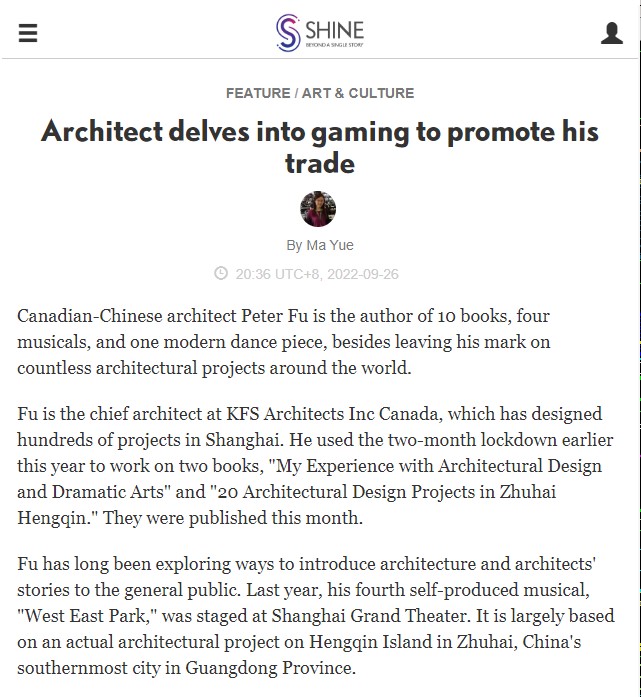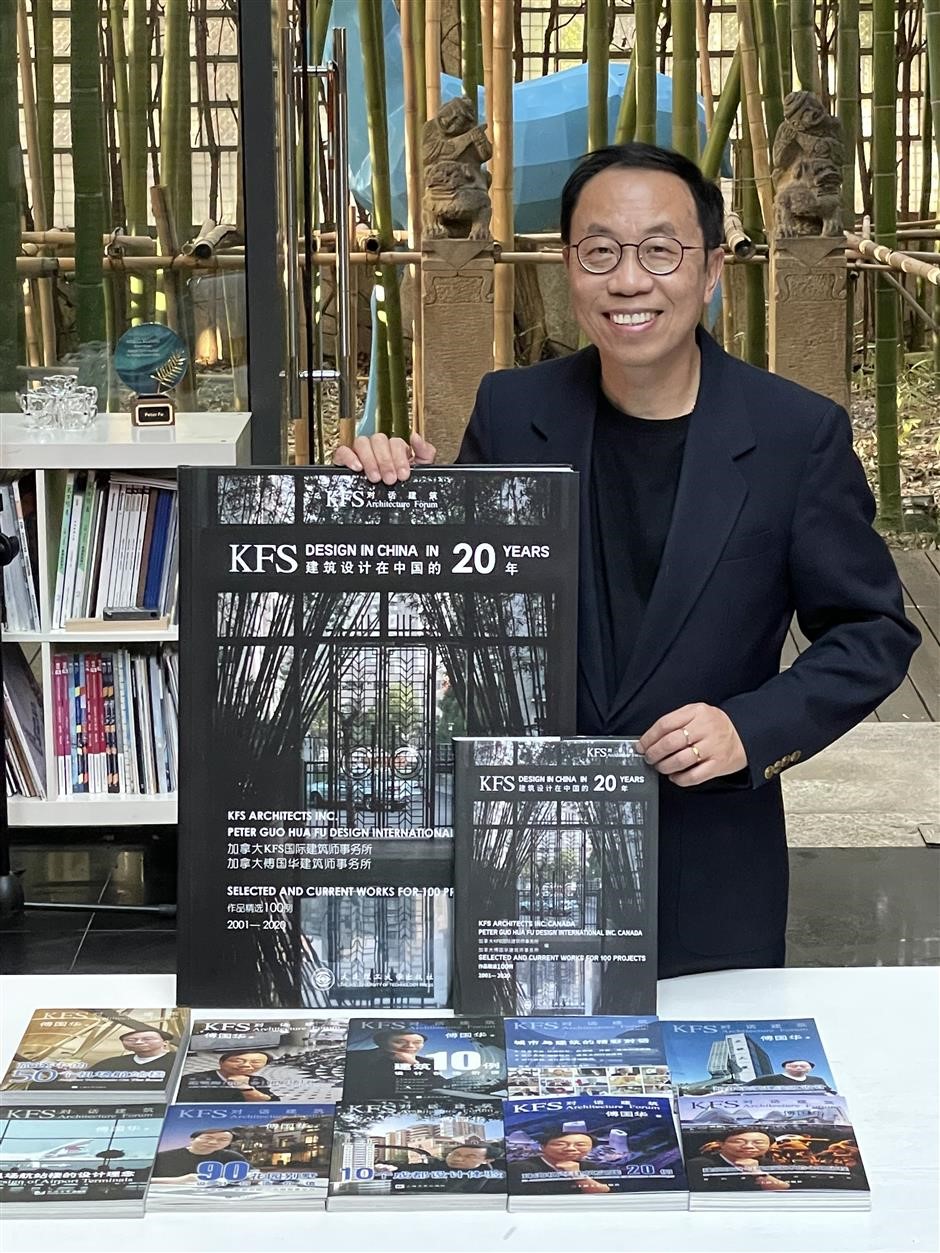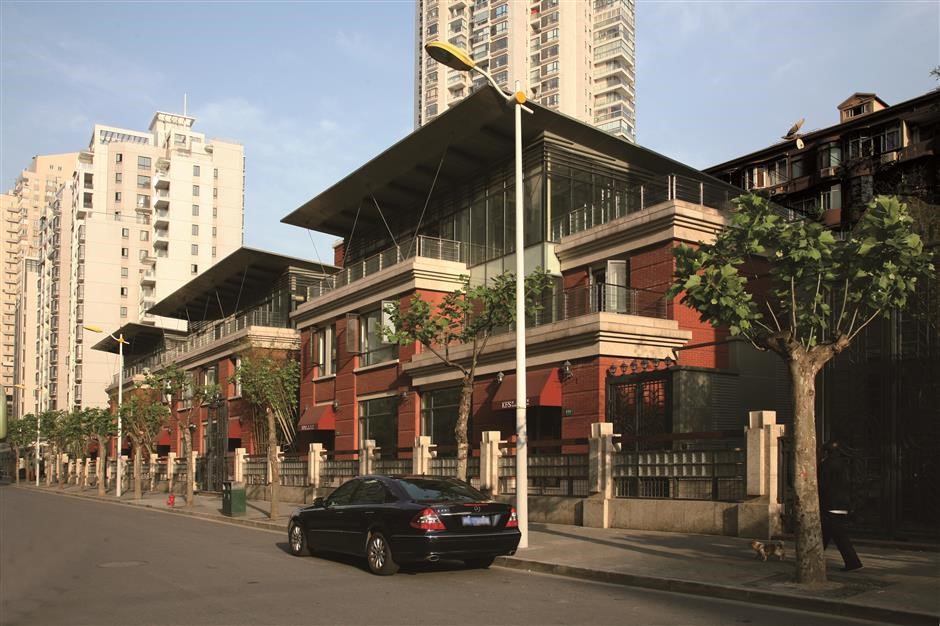|

FEATURE / ART & CULTURE
Architect
delves into gaming to promote his trade
BY Ma Yue
20:36
UTC+8, 2022-09-26
Canadian-Chinese
architect Peter Fu is the author of 10 books, four musicals, and one modern
dance piece, besides leaving his mark on countless architectural projects
around the world.
Fu is the chief
architect at KFS Architects Inc Canada, which has designed hundreds of projects
in Shanghai. He used the two-month lockdown earlier this year to work on two
books, "My Experience with Architectural Design and Dramatic Arts"
and "20 Architectural Design Projects in Zhuhai Hengqin." They were
published this month.
Fu has long been
exploring ways to introduce architecture and architects' stories to the general
public. Last year, his fourth self-produced musical, "West East
Park," was staged at Shanghai Grand Theater. It is largely based on an
actual architectural project on Hengqin Island in Zhuhai, China's southernmost
city in Guangdong Province.

Ti Gong
Peter Fu has
written extensively on architecture.
The playful
architect's next plan is to combine architecture with eSports and computer
games to promote his profession and invite youngsters to experience how a city
takes shape through gaming.
Fu, who studied
architecture and urban planning at Shanghai's Tongji University, got his
doctorate from McGill University in Canada. He founded a design company in
Shanghai more than two decades ago and was honored with a Magnolia award by the
Shanghai government.
McGill
University bestowed an honorary doctorate on him in June. The last Chinese
person to earn the accolade from McGill was renowned scholar Hu Shi about 80
years ago.
In an exclusive
interview with Shanghai Daily, Fu shared his insights on architecture while
also introducing the planned gaming project.

Ti Gong
The Music Box,
built by KFS, is located at Shanghai Culture Square.

Ti Gong
Fu's musical
"Exchange Students" was produced by KFS. It was staged at the Music
Box.
Q: You have produced four
architecture-themed musicals and one dance. Does theater fascinate you?
Fu: I enjoy going to
the theater. When I'm designing a project for a strange city, I often go to the
theaters there and try to borrow inspiration from its folk performances,
because they are usually the essence of local art and culture.
Each of my four
musicals is based on one of my designs. I have put the background story of the
architectural projects, as well as some of my own attitudes toward the
profession, into the musicals.
Musicals appeal
to the younger generation. I intend to stimulate their interest in my
profession.
Q: How do you understand
"readable" buildings?
Fu: Architecture
in a metropolis like Shanghai should have a "readable" history. A
building should have a story to tell. But it would be superficial if you simply
say something like "this building is the former residence of writer Zhang
Ailing…"
To me, it is
more meaningful to record how a building is designed and constructed because
the designers and architects often merge a lot of local history and cultural
elements into the project.
Some of my books
have recorded the construction stories of some selected and signature buildings
in Shanghai and China.

Ti Gong
The Hengqin
Tianmu Music Stage, shaped like a reclining pipa, has become a
landmark on Zhuhai's Hengqin Island.
Q: You and KFS have done a lot of
projects on Zhuhai's Hengqin Island. Is it a hot spot for architects?
Fu: Hengqin is
next to Macau, a young and active area known for its openness and vitality. It
welcomes innovative and creative architectural designs, making it an ideal
place for architects like me.
I was
commissioned to design a landmark structure for Hengqin. Since the name of the
island can be literally translated to "horizontal musical
instrument," I came up with the idea of giving the structure a shape of a
lying pipa, and the result turned out to be satisfying.
Some of the new
construction and architectural designs in Hengqin originated from sparks like
this, and the daring ideas were realized with the support of the local
government. That's why I consider it a hot land.
Q: Your next project will combine
architecture with eSports and computer games. Can you give us more details?
Fu: My purpose
in producing architecture-themed musicals is to arouse people's, especially
youngsters', interest in my industry. But theater performances can only reach a
limited number of audiences. On the other hand, eSports and computer games
appeal to youngsters, including my son.
My next project
is to create an architecture-themed game. A player will be given the role of a
boat owner who anchors at a strange dock. He builds a shelter for the boat and
himself on the river bank. The river bank area is a busy hub in the early
stages of development. Functional structures are slowly built with more people
gathering in the area, and that is how a city expands and grows.
Through the
game, players can take part in the construction of a city and understand the
role architecture plays during the entire process. Not all computer games are
about fighting and violence. It can be constructive too.

Ti Gong
Fu set up his
KFS architecture firm in Shanghai 20 years ago.
Q: Architecture is a demanding profession.
Do you have any advice for architecture students?
Fu: It is a
demanding occupation. One should not only master architectural skills but also
have the ability to coordinate and integrate all kinds of resources. But it's a
rewarding occupation as well.
An architect
might encounter a lot of challenges and restrictions during his work. There are
requirements from different interested parties, and compromise is inevitable. I
treat each of my projects as a puzzle and use my wits and courage to solve it.
Chances are that
an architect can only reach his peak after the age of 40. I want to encourage
students. The profession has a promising future.
Source: SHINE
Editor: Wang Yanlin
|